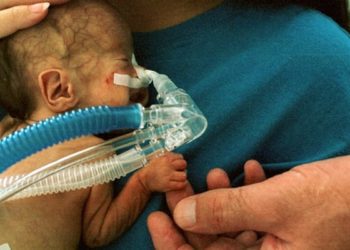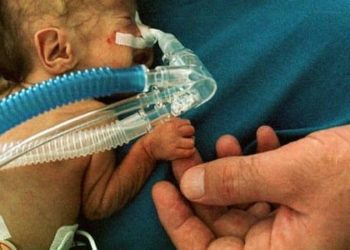Quick Take: Analgesic efficacy and safety of morphine in the Procedural Pain in Premature Infants (Poppi) study: randomised placebo-controlled trial
Infant pain is often undertreated, largely due to a lack of evidence surrounding the immediate and long-term effects of analgesics. In this randomized controlled trial, 31 infants were randomized to receive either 100 μg/kg oral morphine sulphate or placebo 1 hour before a clinically required heel lance and retinopathy of prematurity screening examination to establish whether oral morphine could provide effective and safe analgesia for acute procedural pain in non-ventilated premature infants. Eligible infants were born prematurely at less than 32 weeks’ gestation or with a birth weight lower than 1501 g and had a gestational age of 34-42 weeks at the time of the study. The primary outcome measures were the Premature Infant Pain Profile–Revised (PIPP-R) score after retinopathy of prematurity screening and the magnitude of noxious-evoked brain activity after heel lancing. Secondary outcome measures assessed were physiologic stability and safety. In terms of results, the trial recruitment was stopped due to the profound respiratory adverse effects of morphine without suggestion of analgesic efficacy. None of the co-primary outcome measures differed significantly between groups. The PIPP-R score mean after retinopathy of prematurity screening for the morphine group was 11.1 and 10.5 for the placebo group, with a mean difference of 0.5 (95% CI -2.0 to 3.0, p=0.66). Noxious-evoked brain activity after heel lancing also did not significantly differ between groups (median difference 0.25, 95% CI -0.16 to 0.80, p=0.25). This study therefore shows that administering oral morphine to non-ventilated premature infants for acute procedural pain may cause harm without any obvious benefits including analgesic efficacy. Further studies are needed to validate these results in other subgroups of infants and with different oral morphine doses.
Click to read the study in Lancet
Image: PD
©2018 2 Minute Medicine, Inc. All rights reserved. No works may be reproduced without expressed written consent from 2 Minute Medicine, Inc. Inquire about licensing here. No article should be construed as medical advice and is not intended as such by the authors or by 2 Minute Medicine, Inc.







